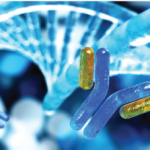
Atacicept failed to improve flare rate or time to first flare in patients with systemic lupus erythematosus (SLE).1 Atacicept is a fusion protein containing the extracellular, ligand-binding portion of the TACI (transmembrane activator and calcium-modulator and cyclophilin-ligand [CAML]-interactor) receptor, and a modified Fc portion of human IgG that blocks BLyS (similar to belimumab). It also contains a B-cell activating factor (a proliferation-inducing ligand [APRIL]). Levels of both APRIL and BlyS are increased in SLE patients, suggesting that blocking both would be more beneficial than blocking either one alone. The agent would also block both plasma and B cells.
This study was a randomized, double-blind, placebo-controlled, Phase 2/3 study in patients with moderate-to-severe SLE. Patients received subcutaneous (SC), twice weekly atacicept 75 mg, atacicept 150 mg or placebo, for four weeks, followed by weekly injections for 48 weeks. The primary outcome measure was the proportion of patients obtaining at least one disease flare during the 52-week trial. The main secondary endpoint was the time to the first flare. The disease flare rate among patients (n=461) treated with 75 mg of atacicept twice weekly was 58% at Week 52. The placebo rate was 54%. The atacicept 150 mg arm was prematurely discontinued due to two deaths. Analysis of the 150 mg atacicept-treated patients suggested a beneficial effect vs. placebo in time to first flare, and flare rates. Both doses of atacicept were associated with decreased total IgG levels, decreased anti-double-stranded DNA (anti-dsDNA) antibody levels and increases in C3 and C4 levels. IgG levels decreased by 30% in the 75 mg atacicept-treated group and by 38% in the 150 mg atacicept-treated group (placebo increased by 3%). Anti-dsDNA also decreased by 31% and 38%, respectively, in the active treatment groups (placebo-treated patients increased by 14%).
Treatment-emergent adverse events were mild to moderate, including upper respiratory infection (17%), urinary tract infection (14%) and headache (16%). The serious infections noted in this study were similar to those seen in both the rituximab and belimumab SLE trials, and the rheumatoid arthritis (RA) atacicept trials. Neither of the two deaths was attributed to study medication.
Mavrilimumab, currently in Phase 2b, is a human monoclonal antibody targeting the alpha subunit of the granulocyte macrophage colony-stimulating factor receptor, which inhibits the mononuclear phagocyte pathway.2 The Phase 2a EARTH study confirmed the efficacy of this agent using ACR20 response, with RA patients showing a rapid clinical response.3 This was a randomized, double-blind, placebo-controlled study in patients (n=239) with moderately active, adult-onset RA, with disease activity score (DAS28-CRP) ≥3.2 for at least a three-month duration despite methotrexate (MTX; dose 7.5–25 mg/week), and positive anticyclic citrullinated peptide antibody >5 IU/mL and/or rheumatoid factor >14 IU/mL. Patients were randomized to receive SC injections every other week of 10, 30, 50 or 100 mg of mavrilimumab or placebo for 12 weeks.
The primary endpoint (the proportion of patients who achieved a ≥1.2 decrease from baseline in DAS28‑CRP at Week 12) was achieved in 41%, 61%, 54%, 67% and 35% of patients, respectively. At Week 12, 56% of mavrilimumab-treated patients compared with 35% of placebo-treated patients achieved the primary endpoint. All ACR20 categories were reached and all mavrilimumab-treated patients showed a response by Week 2. A dose-dependent decrease in biomarkers was observed at Week 12. Adverse reactions were mild to moderate, with no significant hypersensitivity reactions or infections.
In the subsequent Phase 2b study (EARTH EXPLORER-1), mavrilimumab achieved its primary endpoint in 326 patients with moderate-to-severe RA with background MTX following 24 weeks of treatment. Patients received mavrilimumab every two weeks at a low (30 mg), medium (100 mg) or high (150 mg) dose.4 The ACR20 response for active-treated groups compared with placebo was 73% and 25% (p<0.001), respectively. The reduction in the mean DAS28 score at Day 85 was -1.9 and -0.68 (p<0.001), respectively. Secondary endpoints of ACR50, ACR70 and DAS28 remission score achieved statistical significance for the high-mavrilimumab dose. Rapid improvements in patient-reported outcomes, including disability, pain and fatigue, were achieved. The most common adverse events were headache, nasopharyngitis, hypertension, bronchitis and RA worsening.
Drug Safety
In June, the Food and Drug Administration (FDA) publicly released more than 3 million adverse drug event reports and medication errors in a program called Open FDA.5 The FDA hopes that doing this will lead to new medication applications and research. The data released included reports from 2004–13, which prior to this project were only available through the Freedom of Information Act. The Open FDA Project can be accessed via https://open.fda.gov. More information is available on the FDA’s website.
Michele B. Kaufman, PharmD, CGP, RPh, is a freelance medical writer based in New York City, and a pharmacist at New York Presbyterian Lower Manhattan Hospital.
References
- Isenberg D, Gordon C, Licu D, et al. Efficacy and safety of atacicept for prevention of flares in patients with moderate-to-severe systemic lupus erythematosus (SLE): 52-week data (APRIL-SLE randomised trial). Ann Rheum Dis. 2014 Jun 10. doi: 10.1136/annrheumdis-2013-205067. [Epub ahead of print].
- AstraZeneca announces MedImmune’s mavrilimumab and sifalimumab both met primary endpoints in Phase IIb studies. May 12, 2014. http://www.astrazeneca.com/Media/Press-releases/Article/20140512–astrazeneca-announces-medimmunes-mavrilimumab-sifalimumab-met-primary-endpoints-Phase-IIb-studies.
- Burmester GR, Weinblatt ME, McInnes IB, et al. Efficacy and safety of mavrilimumab in subjects with rheumatoid arthritis. Ann Rheum Dis. 2013;72:1445–1452.
- Burmester GR, Takeuchi T, Barbarash O, et al. Presentation #1733: Early and sustained improvement in pain and physical function as measured by visual analog scale and short form-36 physical component summary score in rheumatoid arthritis patients treated with mavrilimumab, an investigational anti-GM-CSFR-alpha monoclonal antibody, in a phase 2a study. ACR/ARHP 2013, San Diego, Oct. 25–30, 2013. https://acr.confex.com/acr/2013/recordingredirect.cgi/id/2398.
- Al-Faruque F. Open FDA project releases millions of reports. The Hill. June 2, 2014. http://thehill.com/policy/healthcare/207922-open-fda


